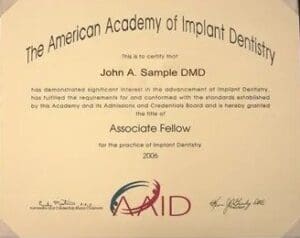-
Online Live Streamed Lecture: Half of our didactic material has moved online, to alleviate the expenses and challenges of travel and allow you to work some of those lecture days and catch up later with the recordings [if you so choose]. Immerse yourself in live, interactive lecture, or self-pace your learning with recordings of live presentations
-
Expanded Learning: The didactic program has expanded from 13 days to 21 days, and additional world-class speakers have been added to our faculty
-
Hands-on In-Person Modules: In-person modules are now in October, November, January, February, April, June, & September, with numerous hands-on workshops, demonstration surgeries, and participant-led live surgeries falling within those modules
- Comprehensive dental implant education offers a thorough understanding of implant dentistry, equipping dental professionals with the necessary skills and knowledge to handle complex cases, address complications, and provide evidence-based care
- It emphasizes a multidisciplinary approach, incorporating the latest research and promoting a multidisciplinary understanding of implant dentistry
- While short educational programs may provide a basic introduction to dental implants, they may not offer the same depth of knowledge and critical thinking skills required for comprehensive patient care
- Investing in comprehensive dental implant education is crucial for clinicians seeking to deliver the highest standard of implant treatment and ensure optimal outcomes for their patients
 The benefits to you: internationally recognized credentials and programs in place to continue your journey in implant dentistry. The MaxiCourse is an introductory program to the field of oral implantology. Upon completion of both the written exam (available at the end of the MaxiCourse) as well as the case presentation and oral exam, dentists earn the title Associate Fellow. With this title comes an official certificate, similar to your diplomas and degrees (see left).
The benefits to you: internationally recognized credentials and programs in place to continue your journey in implant dentistry. The MaxiCourse is an introductory program to the field of oral implantology. Upon completion of both the written exam (available at the end of the MaxiCourse) as well as the case presentation and oral exam, dentists earn the title Associate Fellow. With this title comes an official certificate, similar to your diplomas and degrees (see left).- Lectures
- Clinical sessions
- Online recorded didactic material
- Textbooks reading
- Treatment planning
- Case presentation
- Literature review
- Case study
In general, we do not. We cannot advertise for discounted implant dental work to the general public; moreover, from a learning standpoint, participants are not equipped with the skills and experience to manage their own cases back at their dental practice if they are not working up their own cases for the program. Simply put, it would be a disservice to you to be provided with a patient and never follow that patient before and after surgery.
Philosophically speaking, we feel it is vital for dentists to bring their own patients to a training course to perform dental implant treatment instead of being provided a patient during the course for several reasons:
- Patient Familiarity and Relationship: Bringing their own patients to a training course allows dentists to work with individuals they are already familiar with and have an established relationship. This familiarity enhances communication, trust, and patient comfort during the treatment process. The dentist already has knowledge of the patient’s medical history, oral health condition, and specific needs, which facilitates better treatment planning and personalized care.
- Comprehensive Treatment Planning: By treating their own patients, dentists can conduct a thorough pre-operative assessment, including diagnostic imaging, evaluation of bone quality, and analysis of prosthetic requirements. This comprehensive treatment planning is essential for determining the appropriate implant placement, selecting the right implant system, and creating a personalized treatment plan that aligns with the patient’s specific needs and expectations.
- Long-Term Follow-up and Care: When dentists bring their own patients, they have the opportunity to provide long-term follow-up and care after the training course. Implant treatment involves a healing period, prosthesis fabrication, and maintenance over time. By continuing to care for their own patients, dentists can ensure consistent post-operative monitoring, address any complications, and deliver ongoing maintenance and preventive care as needed.
- Continuity of Care and Accountability: Bringing their own patients to a training course allows dentists to maintain continuity of care throughout the treatment journey. They are accountable for the entire process, from initial diagnosis and treatment planning to post-operative care. This accountability ensures that the dentist takes responsibility for the treatment outcomes and provides optimal patient care.
- Accountability and Ethical Considerations: Taking responsibility for their own patients in dental implant treatment ensures accountability and adherence to ethical considerations. Dentists are better positioned to provide informed consent, discuss potential risks and benefits, and manage post-operative complications effectively. This level of accountability safeguards patient welfare and upholds professional ethical standards.